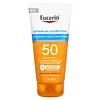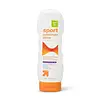What's inside
What's inside
 Key Ingredients
Key Ingredients

 Benefits
Benefits

 Concerns
Concerns

 Ingredients Side-by-side
Ingredients Side-by-side

Butyl Methoxydibenzoylmethane 3%
UV AbsorberHomosalate 9%
Skin ConditioningEthylhexyl Salicylate 4.5%
UV AbsorberOctocrylene 9%
UV AbsorberWater
Skin ConditioningC12-15 Alkyl Benzoate
AntimicrobialNeopentyl Glycol Diheptanoate
EmollientStyrene/Acrylates Copolymer
Butylene Glycol
HumectantDiethylhexyl Syringylidenemalonate
Skin ProtectingVp/Eicosene Copolymer
Sodium Hyaluronate
HumectantGlycyrrhiza Inflata Root Extract
Skin ConditioningGlycyrrhetinic Acid
Skin ConditioningTocopherol
AntioxidantAloe Barbadensis Leaf Juice
Skin Conditioning1,2-Hexanediol
Skin ConditioningHydroxyacetophenone
AntioxidantAcrylates/C10-30 Alkyl Acrylate Crosspolymer
Emulsion StabilisingPotassium Hydroxide
BufferingDisodium EDTA
Sodium Ascorbyl Phosphate
AntioxidantButyl Methoxydibenzoylmethane 3%, Homosalate 9%, Ethylhexyl Salicylate 4.5%, Octocrylene 9%, Water, C12-15 Alkyl Benzoate, Neopentyl Glycol Diheptanoate, Styrene/Acrylates Copolymer, Butylene Glycol, Diethylhexyl Syringylidenemalonate, Vp/Eicosene Copolymer, Sodium Hyaluronate, Glycyrrhiza Inflata Root Extract, Glycyrrhetinic Acid, Tocopherol, Aloe Barbadensis Leaf Juice, 1,2-Hexanediol, Hydroxyacetophenone, Acrylates/C10-30 Alkyl Acrylate Crosspolymer, Potassium Hydroxide, Disodium EDTA, Sodium Ascorbyl Phosphate
Homosalate 10%
Skin ConditioningOctocrylene 6%
UV AbsorberButyl Methoxydibenzoylmethane 3%
UV AbsorberWater
Skin ConditioningCetearyl Alcohol
EmollientStearyl Alcohol
EmollientGlycerin
HumectantAcrylates/C12-22 Alkyl Methacrylate Copolymer
Cetyl Alcohol
EmollientCarbomer
Emulsion StabilisingCeteth-10 Phosphate
CleansingDicetyl Phosphate
EmulsifyingCoco-Glucoside
CleansingXanthan Gum
EmulsifyingDisodium EDTA
Methyl Dihydroabietate
Lauryl PEG-8 Dimethicone
Phenylisopropyl Dimethicone
Skin ConditioningPolyglyceryl-3 Stearate/Isostearate/Dimer Dilinoleate Crosspolymer
HumectantSodium Ascorbyl Phosphate
AntioxidantTocopheryl Acetate
AntioxidantAloe Barbadensis Leaf Juice
Skin ConditioningPhenoxyethanol
PreservativeTriethanolamine
BufferingPropylene Glycol
HumectantHydroxyacetophenone
AntioxidantHomosalate 10%, Octocrylene 6%, Butyl Methoxydibenzoylmethane 3%, Water, Cetearyl Alcohol, Stearyl Alcohol, Glycerin, Acrylates/C12-22 Alkyl Methacrylate Copolymer, Cetyl Alcohol, Carbomer, Ceteth-10 Phosphate, Dicetyl Phosphate, Coco-Glucoside, Xanthan Gum, Disodium EDTA, Methyl Dihydroabietate, Lauryl PEG-8 Dimethicone, Phenylisopropyl Dimethicone, Polyglyceryl-3 Stearate/Isostearate/Dimer Dilinoleate Crosspolymer, Sodium Ascorbyl Phosphate, Tocopheryl Acetate, Aloe Barbadensis Leaf Juice, Phenoxyethanol, Triethanolamine, Propylene Glycol, Hydroxyacetophenone
 Reviews
Reviews

Ingredients Explained
These ingredients are found in both products.
Ingredients higher up in an ingredient list are typically present in a larger amount.
Aloe Barbadensis Leaf Juice comes from leaves of the aloe plant. Aloe Barbadensis Leaf Juice is best known for helping to soothe sunburns. It is also anti-inflammatory, moisturizing, antiseptic, and can help heal wounds.
Aloe is packed with good stuff including Vitamins A, C, and E. These vitamins are antioxidants, which help fight free-radicals and the damage they may cause. Free-radicals are molecules that may damage your skin cells, such as pollution.
Aloe Barbadensis Leaf Juice also contains sugars. These sugars come in the form of monosaccharides and polysaccharides, folic acid, and choline. These sugars are able to help bind moisture to skin.
It also contains minerals such as calcium, 12 anthraquinones, fatty acids, amino acids, and Vitamin B12.
Learn more about Aloe Barbadensis Leaf JuiceAlso known as Avobenzone, this ingredient is a chemical sunscreen filter that provides protection in the UV-A range.
Avobenzone is globally approved and is the most commonly used UV-A filter in the world.
Studies have found that avobenzone becomes ineffective when exposed to UV light (it is not photostable; meaning that it breaks down in sunlight). Because of this, formulations that include avobenzone will usually contain stabilizers such as octocrylene.
However, some modern formulations (looking at you, EU!) are able to stabilize avobenzone by coating the molecules.
Avobenzone does not protect against the UV-B range, so it's important to check that the sunscreen you're using contains other UV filters that do!
The highest concentration of avobenzone permitted is 3% in the US, and 5% in the EU.
Learn more about Butyl MethoxydibenzoylmethaneDisodium EDTA plays a role in making products more stable by aiding other preservatives.
It is a chelating agent, meaning it neutralizes metal ions that may be found in a product.
Disodium EDTA is a salt of edetic acid and is found to be safe in cosmetic ingredients.
Learn more about Disodium EDTAHomosalate is a chemical sunscreen filter that provides protection in the UV-B range (280nm - 320 nm), with a peak protection at 306 nm. It is internationally approved for use in sunscreens.
Homosalate is not photo-stable, meaning it's strength as a UV filter degrades over time with exposure to the sun. Because of this, it's often used in combination with other chemical sunscreen filters as avobenzone (which protects from the UV-A range). Homosalate also helps act as a solvent for harder-to-dissolve UV filters.
(Part of the reason that sunscreens need to be frequently re-applied is due to the photo instability of many chemical sunscreen filters)
Currently, homosalate is approved in concentrations up to 10% in the EU and 15% in the US. The FDA is currently doing further research on the effects of homosalate, and it is possible that these approved concentrations will change in the future.
Learn more about HomosalateHydroxyacetophenone is antioxidant with skin conditioning and soothing properties. It also boosts the efficiency of preservatives.
This ingredient is not irritating or sensitizing.
Octocrylene protects skin from sun damage. It absorbs UV-B with peak absorption of 304 nm. It is a common sunscreen ingredient and often paired with avobenzone, a UVA filter. This is because octocrylene stabilizes other sunscreen ingredients by protecting them from degradation when exposed to sunlight. Octocrylene is a photostable ingredient and loses about 10% of SPF in 95 minutes.
Octocrylene also acts as an emollient, meaning it helps skin retain moisture and softens skin. It is oil-soluble and hydrophobic, enhancing water-resistant properties in a product.
Those who are using ketoprofen, a topical anti-inflammatory drug, may experience an allergic reaction when using octocrylene. It is best to speak with a healthcare professional about using sunscreens with octocrylene.
The EU allows a maximum of these concentrations:
Learn more about OctocryleneSodium Ascorbyl Phosphate is a form of Vitamin C. It is the salt of ascorbic acid.
This ingredient is more gentle than ascorbic acid. It is also more stable when exposed to light and oxygen.
Vitamin C helps reduce redness, improve skin texture, reduce the effects of aging, reduce the visibility of dark spots, and brighten skin.
Your skin uses Vitamin C to produce collagen and collagen production plays a role in having a strong skin barrier and plump skin. As an antioxidant, this ingredient also helps reduce the signs of aging such as fine-lines and wrinkles.
VItamin C helps brighten skin by blocking the process of skin darkening.
In a 2011 study, Sodium Ascorbyl Phosphate was found to have antibacterial properties. This may help treat acne.
Read more about other types of Vitamin C:
Learn more about Sodium Ascorbyl PhosphateWater. It's the most common cosmetic ingredient of all. You'll usually see it at the top of ingredient lists, meaning that it makes up the largest part of the product.
So why is it so popular? Water most often acts as a solvent - this means that it helps dissolve other ingredients into the formulation.
You'll also recognize water as that liquid we all need to stay alive. If you see this, drink a glass of water. Stay hydrated!
Learn more about Water